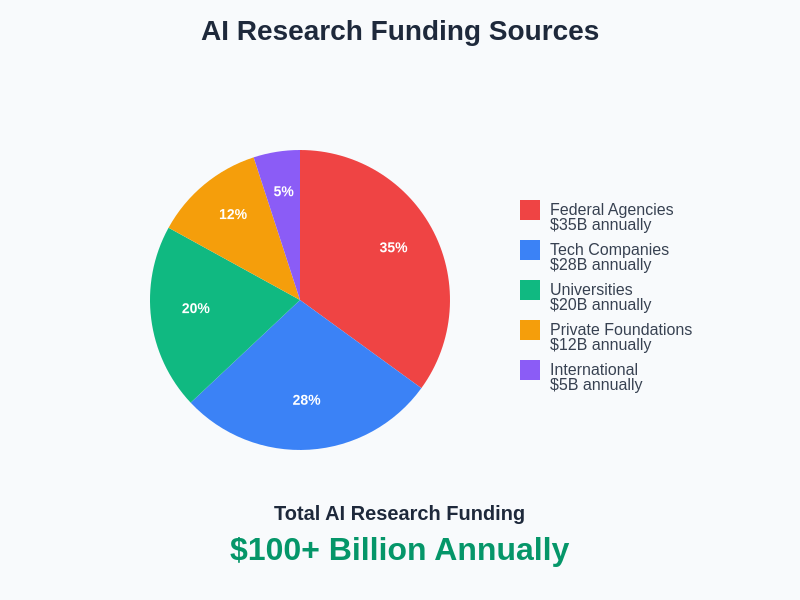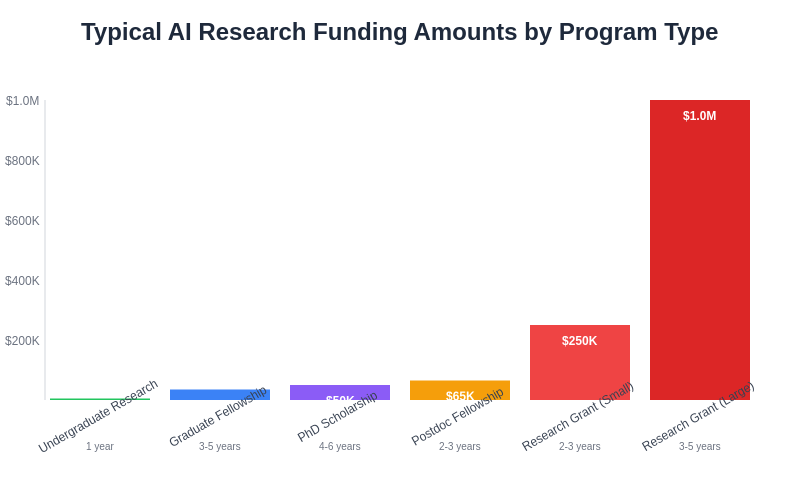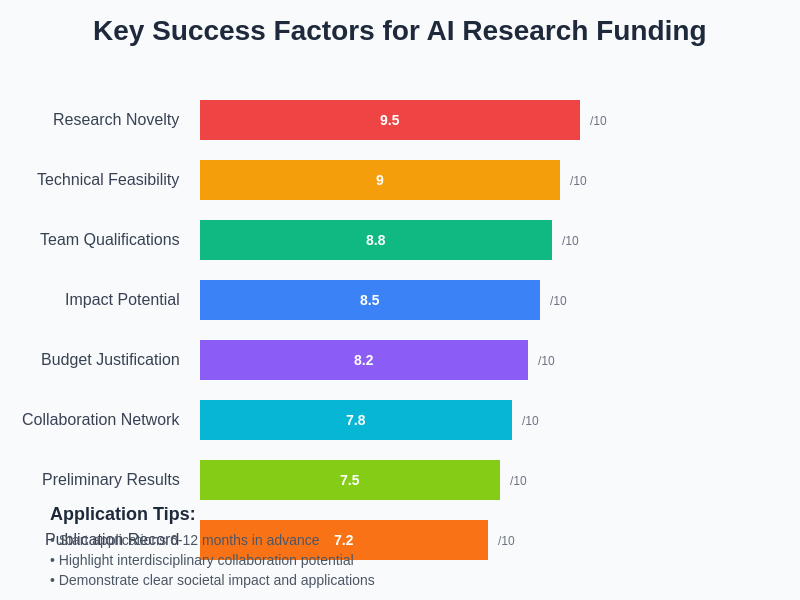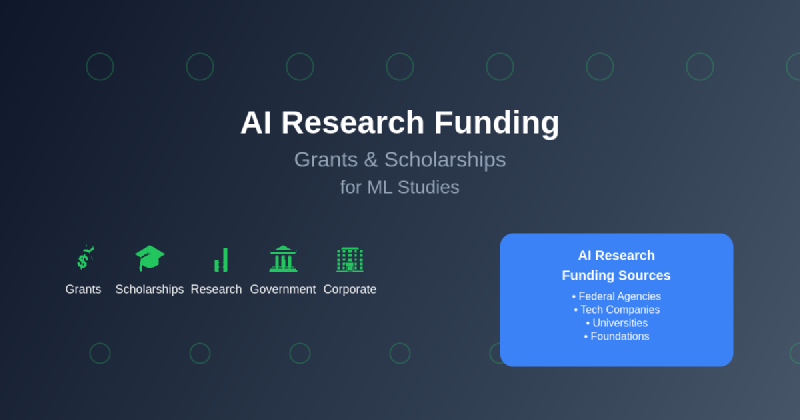The rapidly expanding field of artificial intelligence and machine learning research requires substantial financial investment to support groundbreaking discoveries and innovative applications. As the demand for skilled AI researchers continues to grow exponentially, numerous funding opportunities have emerged to support students, researchers, and institutions pursuing advanced studies in these transformative technologies. Understanding the landscape of available grants, scholarships, and fellowship programs is crucial for anyone seeking to advance their career in AI research while managing the significant costs associated with graduate education and research endeavors.
Stay updated with the latest AI research trends and funding announcements to discover emerging opportunities and cutting-edge developments in the field. The intersection of academic excellence and financial support creates pathways for talented individuals to contribute meaningfully to the advancement of artificial intelligence while building sustainable careers in research and development.
Understanding the AI Research Funding Ecosystem
The contemporary funding landscape for AI research encompasses a diverse array of sources, ranging from government agencies and private foundations to technology corporations and academic institutions. This multifaceted ecosystem reflects the strategic importance that various stakeholders place on advancing artificial intelligence capabilities and ensuring a robust pipeline of skilled researchers. Government funding agencies recognize AI research as critical to national competitiveness and security, while private sector organizations invest heavily in research partnerships to drive innovation and maintain technological leadership in rapidly evolving markets.
The complexity of this funding environment requires prospective researchers to develop sophisticated strategies for identifying, applying for, and managing multiple funding sources throughout their academic and research careers. Successful navigation of these opportunities demands not only academic excellence but also strategic planning, networking skills, and the ability to articulate research vision in ways that resonate with diverse funding priorities and objectives.

The distribution of AI research funding across different sectors reveals the substantial investment being made by federal agencies, technology companies, and academic institutions. Understanding this landscape helps researchers identify the most appropriate funding sources for their specific research objectives and career stages.
Federal and National Funding Programs
Government agencies represent some of the most significant and prestigious sources of AI research funding, offering both substantial financial support and valuable recognition within the research community. The National Science Foundation provides extensive funding through programs such as the Computer and Information Science and Engineering directorate, which supports fundamental research in machine learning, computer vision, natural language processing, and related AI domains. These programs typically fund multi-year projects with budgets ranging from tens of thousands to several million dollars, depending on the scope and significance of proposed research.
The Department of Defense, through agencies such as the Defense Advanced Research Projects Agency and the Office of Naval Research, maintains robust funding programs focused on AI applications with national security implications. These opportunities often provide substantial resources for research projects that demonstrate potential for military applications while advancing fundamental knowledge in areas such as autonomous systems, decision support technologies, and human-machine collaboration frameworks.
Explore comprehensive AI research tools and resources to enhance your funding applications and research proposals with advanced analysis and writing assistance. The integration of AI tools in the research process itself has become increasingly valuable for developing competitive proposals and conducting sophisticated analyses that strengthen funding applications.
Corporate and Industry Partnerships
Technology companies have emerged as major contributors to AI research funding, recognizing the strategic value of maintaining close relationships with academic institutions and supporting the development of future talent. Companies such as Google, Microsoft, Amazon, and Facebook provide substantial funding through dedicated research programs, graduate fellowships, and collaborative research initiatives that bridge academic research with industry applications.
Google’s AI for Social Good program exemplifies how corporate funding can support research with broader societal impact while advancing fundamental AI capabilities. These programs typically seek projects that demonstrate both technical innovation and potential for addressing significant social challenges such as healthcare, environmental sustainability, climate change, and educational access. The combination of financial support and access to proprietary datasets, computing resources, and industry expertise makes corporate partnerships particularly valuable for researchers working on applied AI problems.
Microsoft Research provides extensive funding through programs such as the Microsoft PhD Fellowship and various collaborative research initiatives that support graduate students and faculty working on cutting-edge AI problems. These partnerships often include access to cloud computing resources, software platforms, and collaboration opportunities with industry researchers, creating comprehensive support ecosystems that extend far beyond traditional financial assistance.
International and Global Funding Opportunities
The global nature of AI research has created numerous international funding opportunities that support collaborative research, student exchange programs, and cross-border research initiatives. The European Union’s Horizon Europe program represents one of the most significant international funding mechanisms, supporting large-scale research projects that advance AI technologies while addressing societal challenges and promoting European competitiveness in the global AI landscape.
International organizations such as the World Health Organization, UNESCO, and various United Nations agencies provide funding for AI research projects that address global challenges in areas such as public health, education, sustainable development, and humanitarian assistance. These opportunities often emphasize the potential for research outcomes to benefit developing countries and underserved populations, creating pathways for researchers interested in applying AI technologies to address global inequality and promote social justice.
The emergence of international AI research networks and consortiums has also created new funding models that support collaborative research across multiple institutions and countries. These programs recognize that many of the most significant challenges in AI research require interdisciplinary collaboration and the integration of diverse perspectives, cultural contexts, and technical approaches that can only be achieved through international partnerships.
Academic Institution Scholarships and Fellowships
Universities and academic institutions offer extensive scholarship and fellowship programs specifically designed to support graduate students pursuing AI and machine learning research. These programs often provide comprehensive support that includes tuition coverage, living stipends, research funding, and access to specialized facilities and equipment. The most prestigious programs, such as those offered by Stanford, MIT, Carnegie Mellon, and other leading research institutions, are highly competitive but provide exceptional opportunities for students to work with world-renowned faculty and contribute to groundbreaking research projects.
Many institutions have established endowed fellowships specifically focused on AI research, often funded by alumni who have achieved success in technology industries and wish to support the next generation of researchers. These fellowships typically provide multi-year support that allows students to focus intensively on their research without the financial pressures that can compromise academic performance and research productivity.

The variation in funding amounts across different program types reflects the diverse stages of academic and research careers, from undergraduate research opportunities through large-scale research grants. Understanding these funding levels helps researchers set realistic expectations and plan appropriate application strategies for their career stage and research scope.
Leverage advanced research capabilities with Perplexity to conduct comprehensive literature reviews and identify funding opportunities that align with your specific research interests and career objectives. The ability to efficiently process vast amounts of information about funding opportunities has become essential for developing competitive application strategies.
Specialized Funding for Underrepresented Groups
Recognizing the importance of diversity in AI research, numerous funding programs specifically target underrepresented groups including women, minorities, first-generation college students, and individuals from economically disadvantaged backgrounds. Organizations such as the National Center for Women in Information Technology, the Computing Research Association, and various professional societies maintain scholarship and fellowship programs designed to increase participation of underrepresented groups in AI and computer science research.
These programs often provide not only financial support but also mentorship, networking opportunities, and professional development resources that help recipients navigate the challenges of academic research careers while building supportive professional networks. The recognition that diversity of perspectives and experiences is essential for developing AI technologies that serve all members of society has driven increased investment in these targeted funding programs.
Corporate diversity and inclusion initiatives have also created substantial funding opportunities for underrepresented groups pursuing AI research. Companies increasingly recognize that diverse research teams produce more innovative solutions and are better positioned to identify and address potential biases in AI systems, leading to increased investment in scholarship programs that support diversity in AI research communities.
Research Grant Application Strategies
Successfully obtaining AI research funding requires sophisticated application strategies that go beyond academic excellence to encompass effective communication, strategic alignment with funder priorities, and compelling articulation of research significance and potential impact. The most successful applications demonstrate clear understanding of the funding organization’s mission and strategic objectives while presenting research proposals that advance both fundamental knowledge and practical applications with demonstrated societal benefit.
Developing competitive funding applications requires extensive preparation that includes thorough literature reviews, preliminary research results, detailed experimental plans, and realistic budget projections that accurately reflect the resources required to complete proposed research. The ability to clearly communicate complex technical concepts to diverse audiences, including program officers who may not have specialized expertise in specific AI domains, is essential for developing applications that resonate with review panels and funding committees.
Collaboration and partnership development have become increasingly important elements of successful funding strategies, as many programs prioritize interdisciplinary research that integrates AI technologies with other domains such as healthcare, environmental science, social sciences, and humanities. Building relationships with researchers in complementary fields and developing collaborative research proposals that leverage diverse expertise can significantly strengthen funding applications while creating opportunities for more impactful research outcomes.

The relative importance of different success factors in funding applications highlights the critical elements that review panels and program officers consider when evaluating proposals. Research novelty and technical feasibility consistently rank highest, while factors such as team qualifications and impact potential also play crucial roles in funding decisions.
Managing Multiple Funding Sources
Advanced AI research projects often require substantial resources that exceed the capacity of individual funding programs, necessitating sophisticated strategies for combining multiple funding sources while managing complex compliance requirements and reporting obligations. Successful researchers develop expertise in identifying complementary funding opportunities that can be combined to support comprehensive research programs without creating conflicts of interest or violating funder restrictions on concurrent support.
The management of multiple funding streams requires careful attention to intellectual property considerations, publication requirements, and data sharing obligations that may vary significantly across different funding sources. Understanding these requirements and developing research plans that satisfy multiple funders while maintaining research integrity and academic freedom requires considerable expertise and strategic planning.
Financial management skills become crucial for researchers managing multiple grants, as different funding sources often have distinct budget categories, allowable expenses, and reporting requirements that must be carefully tracked and documented. The ability to effectively manage research budgets, track expenditures, and provide accurate financial reporting is essential for maintaining funder relationships and ensuring continued support for ongoing research activities.
Emerging Funding Models and Trends
The AI research funding landscape continues to evolve rapidly, with new funding models emerging that reflect changing priorities and innovative approaches to supporting research and development. Crowdfunding platforms have begun to play a role in supporting certain types of AI research projects, particularly those with clear societal applications and the potential to engage public interest and support.
Blockchain-based funding mechanisms and decentralized autonomous organizations represent emerging models that could potentially transform how AI research is funded and governed, though these approaches remain largely experimental and face significant regulatory and practical challenges. The increasing emphasis on open science and reproducible research has also influenced funding priorities, with many programs now requiring data sharing, code availability, and adherence to open access publication policies.
The growing recognition of AI safety and ethics as critical research areas has led to the emergence of specialized funding programs focused on developing AI systems that are safe, reliable, and aligned with human values. Organizations such as the Future of Humanity Institute, the Centre for the Study of Existential Risk, and various philanthropic foundations provide funding specifically for research on AI alignment, safety, and beneficial AI development.
Building Long-Term Research Careers
Successful AI research careers require strategic planning that extends beyond individual funding applications to encompass long-term career development, network building, and the establishment of sustainable research programs that can attract continued funding support. The most successful researchers develop expertise in identifying emerging research opportunities, building interdisciplinary collaborations, and positioning their work to address evolving societal needs and technological challenges.
Mentorship relationships play a crucial role in career development, providing guidance on funding strategies, research direction, and professional development opportunities that can accelerate career advancement. Experienced researchers who have successfully navigated the funding landscape can provide invaluable insights into application strategies, reviewer expectations, and the unwritten rules that govern academic research funding.
The development of strong professional networks through conference participation, collaborative research projects, and professional society involvement creates opportunities for learning about funding opportunities, forming research partnerships, and building the relationships that often prove essential for securing major research grants and advancing to senior research positions.
Future Directions and Opportunities
The future of AI research funding is likely to be shaped by several key trends including increased emphasis on interdisciplinary research, greater focus on AI safety and ethics, growing interest in AI applications for addressing global challenges, and continued expansion of international collaborative research programs. Understanding these trends and positioning research agendas to align with emerging priorities will be essential for securing funding in an increasingly competitive environment.
The increasing integration of AI technologies into every aspect of society is creating new funding opportunities in domains that have not traditionally been associated with computer science research, including areas such as digital humanities, social work, public policy, and creative arts. Researchers who can effectively bridge AI technologies with these diverse domains may find unique funding opportunities that are less competitive than traditional computer science programs while offering the potential for significant impact and innovation.
The continued growth of AI research funding reflects the recognition that artificial intelligence represents one of the most significant technological developments in human history, with the potential to transform virtually every aspect of human society. The substantial investment in AI research funding represents not only an opportunity for individual researchers but also a collective commitment to ensuring that these powerful technologies are developed responsibly and deployed in ways that benefit all members of society.
Disclaimer
This article is for informational purposes only and does not constitute financial, legal, or career advice. Funding opportunities, application requirements, and eligibility criteria can change frequently, and readers should verify current information directly with funding organizations before applying. The availability and terms of funding programs may vary by location, institution, and individual circumstances. Success in obtaining research funding depends on many factors including academic qualifications, research quality, and alignment with funder priorities.
